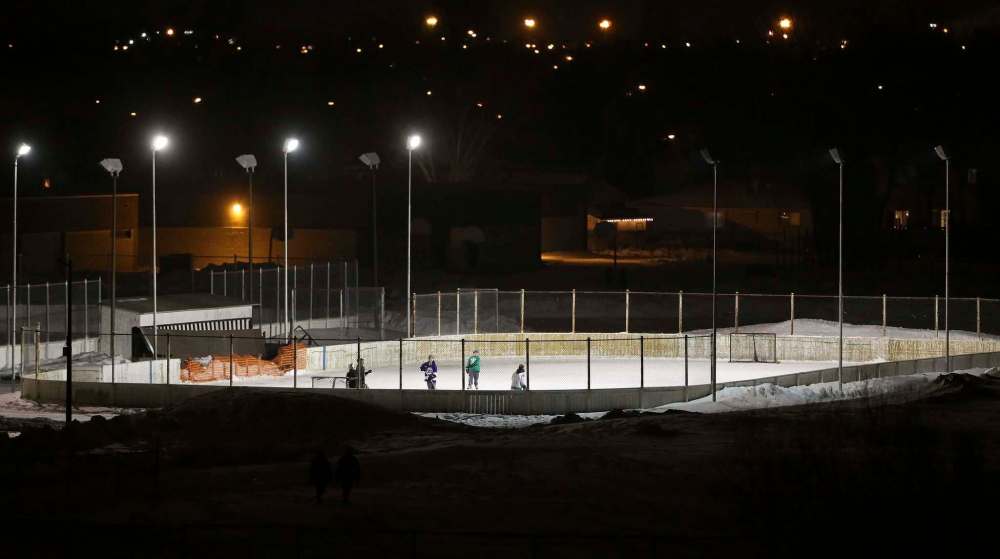Recreation facilities often unfit for people with disabilities
Advertisement
Read this article for free:
or
Already have an account? Log in here »
To continue reading, please subscribe:
Monthly Digital Subscription
$0 for the first 4 weeks*
- Enjoy unlimited reading on winnipegfreepress.com
- Read the E-Edition, our digital replica newspaper
- Access News Break, our award-winning app
- Play interactive puzzles
*No charge for 4 weeks then price increases to the regular rate of $19.00 plus GST every four weeks. Offer available to new and qualified returning subscribers only. Cancel any time.
Monthly Digital Subscription
$4.75/week*
- Enjoy unlimited reading on winnipegfreepress.com
- Read the E-Edition, our digital replica newspaper
- Access News Break, our award-winning app
- Play interactive puzzles
*Billed as $19 plus GST every four weeks. Cancel any time.
To continue reading, please subscribe:
Add Free Press access to your Brandon Sun subscription for only an additional
$1 for the first 4 weeks*
*Your next subscription payment will increase by $1.00 and you will be charged $16.99 plus GST for four weeks. After four weeks, your payment will increase to $23.99 plus GST every four weeks.
Read unlimited articles for free today:
or
Already have an account? Log in here »
Hey there, time traveller!
This article was published 03/12/2018 (2584 days ago), so information in it may no longer be current.
Everyone pays for recreation facilities, so we should all be able to use them. That includes people with disabilities.
In Winnipeg, if you’re a parent of a child with special needs, accessing programs such as swimming and skating can feel impossible.
The city’s Leisure Guide says every effort will be made to accommodate those with disabilities. This is also said by staff at other facilities not owned by the city.

However, these statements typically amount to lip service. All too often, accommodations aren’t made.
Though the Leisure Guide states the city will try to find an attendant to help if the person with challenges needs assistance, it also notes that “aquatics are an exception.”
We’re lucky to have SwimAbility Manitoba, which helps kids with challenges, but it takes 18 to 24 months to get off the current wait list to get a child into the pool.
A possible solution is that a child with challenges should have private lessons. Yet, families with kids with special needs are often least able to afford this option.
With non-visible disabilities such as autism, ADHD and sensory processing disorder, sometimes the problems worsen because the child looks neuro-typical. A noisy arena or crowded pool can be too stimulating an environment for them to learn, but when are rinks or pools quiet enough for children with challenges?
Even if a child can handle crowded areas, sometimes a facility refuses to turn down the music. For some people, fun requires loud noise. For others, the noise keeps them from learning the basics. Shutting off the music for an hour lets a child with challenges gain lifelong skills.
The effort of constantly advocating for such measures, and facing tone-deaf objections because your child “looks normal,” can make a parent keep that child at home rather than learning and playing with friends.
I know a parent who called arenas throughout the city. She hoped to find a quieter learn-to-skate program or private lessons. There was nothing available for special-needs children. She settled for an outdoor rink with an acquaintance to help their children skate, but it was a cold winter. They only fit in a few lessons. Both children want to skate more, but this outdoor rink option works only when good weather and the volunteer helper are available.
Advocating for everyone, including those with differences, means acknowledging that every person deserves equal access. Our province should be committed to equal rights to recreation, as well as health care and appropriate education.
We pay taxes and we need reasonable and equal access. It can mean a curb cut in the sidewalk, an accessible swimming pool or an arena or community centre with ramps rather than stairs.
Parents want to help their kids become their best adult selves. Children with challenges grow up to be some of society’s most creative, out-of-the-box thinkers because of their early experiences. However, regardless of your gifts or challenges, if you fall into the water, you drown if you can’t swim.
Basic skills such as swimming and skating are often impossible goals for families with special needs. Legislation for special-needs renovations and support for socializing and recreation is part of the Accessibility for Manitobans Act, but so far, we lack funding and enforcement.
If we don’t enable people with disabilities to exercise and gain basic life skills, we cost Manitoba more down the road for expenses, including health care.
Enforcing the law might mean all the difference in the future. After all, not all disabilities come at birth. One day, you, or someone you know, may be the person who can’t access sidewalks or a pool, gym or arena.
We all deserve better.
Joanne Seiff is a freelance writer and the author of three books. She’s also the mother, aunt and sister of people with special needs.

